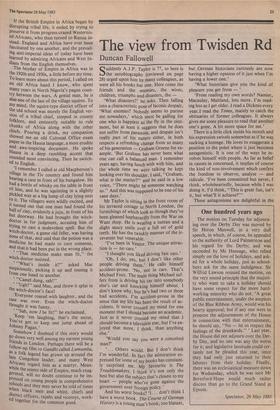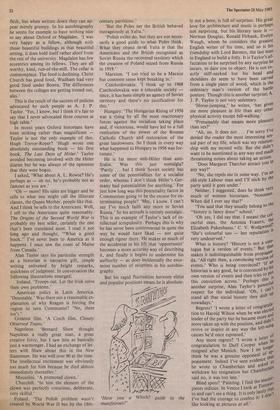The view from Twisden Rd
Duncan Fallowell
uddenly A.J.P. Taylor is 77, so here is 1...3 the autobiography (reviewed on page 28) urged upon him by many colleagues, as were all his books bar one. Here come the friends and the enemies, the wives, children, triumphs and disasters, the -
'What disasters?' he asks. Then falling into a characteristic pose of laconic despair, `What enemies? Nobody seems to pursue me nowadays,' which must be galling for one who is happiest as the fly in the oint- ment, but at least it suggests that he does not suffer from paranoia, and despair isn't really part of his nature either, in both respects a refreshing change from so many of his generation — Graham Greene for ex- ample. 'But Graham has never been what one can call a balanced man. I remember years ago, having lunch with with him, and the whole time we were talking he kept looking over his shoulder. I said, "Graham, what is the matter?" and he said in a low voice, "There might be someone watching us." And this was supposed to be one of his sane days.'
Mr Taylor is sitting in the front room of his terraced cottage in North London, the furnishings of which look as though they've been gleaned haphazardly from the War on Want shop. He is wearing a suntan and a slight saucy smile over a full set of gold teeth. He has the twinkly manner of the ir- reverent but venerable.
`I've been in Venice. The unique attrac- tion is — no cars.'
`I thought you liked driving fast cars.'
`Oh, 1 do, yes, but I don't like other people driving them.' He calls himself accident-prone. `No, not in cars. That's Michael Foot. The main thing Michael suf- fers from is driving his car into somebody else's car and knocking himself about. I don't know why, but he's had two or three bad accidents. I'm sense accident-prone in the ense that my life has been the result of ac- cidents. It never crossed my mind for one moment that I should become an academic. Just as it never crossed my mind that I should become a television star, but I've en- joyed that more, I think, than anything else.'
`Would you say you were a conceited man?'
... Others would. But I don't think I'm wonderful. In fact the admiration ex- pressed for some of my books has constant- ly surprised me. My favourite is The Troublemakers. I think it's not only the best but also the subject that's closest to my heart — people who've gone against the government over foreign policy.'
And his worst books?
`I ... don't think I have a worst book. The Course of German History is a young man's book, too blatant,
but German historians curiously are now having a higher opinion of it just when I'm having a lower one.'
'What historians give you the kind of pleasure you get from — '
'From reading my own words? Namier, Macaulay, Maitland, lots more. I'm read- ing less as I get older. I read a Dickens every year.I read the Times, mainly to catch the obituaries of former colleagues. It always gives me some pleasure to read that another one's gone. A bit more space for me.'
There is a little click inside his mouth and his expression swivels somewhat as if he was sucking a lozenge. He loves to exaggerate a position to the point where it just becomes antagonistic. It is one of the ways he in- volves himself with people. As far as belief in causes in concerned, it implies of course the kind of non-involvement which confers the freedom to observe, analyse — and ridicule. 'I've been committed but never, I think, wholeheartedly, because while I was doing it, I'd think, "This is great fun, isn't it, but what'll it achieve?"' These antagonisms are delightful in the flesh, but when written down they can ap- pear merely grumpy. In his autobiography he seems for example to have nothing nice to say about Oxford or Magdalen. 'I was very happy as a fellow, although with those beautiful buildings in that beautiful setting, it does hold itself rather aloof from the rest of the university. Magdalen has few eccentrics among its fellows. They are all worthy, kind, run-of-the-mill. The cellar is commonplace. The food is declining. Christ Church has good food, Wadham had very good food under Bowra. The differences between the colleges are getting ironed out, alas.'
This is the result of the success of policies advocated by such people as A. J. P. Taylor. 'Yes, I know, but I think it's fair to say that I never advocated three courses at high table.'
In recent years Oxford historians have been striking rather than magnificent Taylor is not the only example of this. Hugh Trevor-Roper? 'Hugh wrote one absolutely outstanding book — his first book, The Last Days of Hitler.' Taylor avoided becoming involved with the Hitler diaries but he was always of the opionion that they were bogus.
I asked, 'What about A. L. Rowse? He's perhaps as — oh no, he's probably not as famous as you are.'
'Oh — more! His sales are bigger and he sells to what one might call the illiterate classes, the Queen Mother, people like that. And I think he sells to the Americans. Well, I sell to the Americans quite reasonably. The Origins of the Second World War is probably my best seller, certainly the one that's been translated most. I read it not long ago and thought, "What a good book." I've never been to America as it happens. I once saw the coast of Maine from Canada.'
Alan Taylor says his particular strength as a historian is narrative gift, simple writing enlivened by bright remarks, quickness of judgment. In conversation the following illustrations emerged: Ireland. 'Troops out. Let the Irish solve their own problems.'
American policy in Latin America. 'Detestable.' Was there not a reasonable ex- planation of why Reagan is forcing the region to turn Communist? `No, there isn't.'
Greatest film. 'A Czech film, Closely Observed Trains.'
Napoleon. 'Bernard Shaw thought Napolean a really great man, a great creative force, but I saw him as basically
just a warmonger. I had an exchange of let- ters with Shaw about this in the New Statesman. He was well over 90 at the time. The intellectual excitement was obviously too much for him because he died almost immediately thereafter.'
Mussolini. 'A promoted clown.'
Churchill. 'In him the element of the clown was perfectly conscious, deliberate, very skilful.'
Poland. 'The Polish problem wasn't created by World War II but by the 18th-
century partitions.'
`But the Poles say the British behaved outrageously at Yalta.'
`Polish exiles do, but they are not neces- sarily a good guide to what Poles think. What they object to at Yalta is that the Americans and the British recognised as Soviet Russia the recovered territory which the creation of Poland seized from Russia in 1919.'
Marxism. 'I too tried to be a Marxist but common sense kept breaking in.'
Czechoslovakia. 'I think up to 1968 Czechoslovakia was a tolerable society since, it has been simply an agency of Soviet territory and there's no justification for this.'
Hungary. 'The Hungarian Rising of 1956 was a rising by all the most reactionary forces against the socialism taking place and, if victorious, would have led to a full restitution of the power of the Roman Catholic Church and restoration of the great landowners. So I think in every way what happened to Hungary in 1956 was for- tunate.'
He is far more anti-Hitler than anti- Stalin. Was this just nostalgia? `Partly ... but I think Soviet society has some of the potentialities for a socialist order, whereas I don't think Hitler's Ger- many had potentialities for anything.' For just how long was this potentiality factor in Communism going to be the excuse for ex- terminating people? `Mm, I know. I can't say I've much faith any more in Soviet Russia.' So his attitude is entirely nostalgic. This is an example of Taylor's lack of in- tellectual scrupulosity. Perhaps this is why he has never been controversial in quite the way he would have liked — not quite enough rigour there. He makes so much of the accidental in his life that 'opportunist' becomes a more accurate way of describing it, and finally it begins to undermine his authority — as does incidentally the enor- mous number of misprints in his autobio- graphy.
But his rapid fluctuation between elitist and populist positions means he is absolute- 'Have you a Which? guide to the manifestoes?' ly not a bore, is full of surprises. His great
love for architecture and music is perhaps not surprising, but his literary taste is — Norman Douglas, Ronald Firbank, Evelyn Waugh, whom he considers the greatest English writer of his time, and so is his friendship with Lord Berners, the last man in England to build a folly. It is Taylor's af- fectation to be surprised by any surprise he incurs, to dare you to object. He is not ex- actly stiff-necked but his head and shoulders do seem to have been carved from a single piece of wood, which is the sedentary man's version of the battle posture. Though this is another surprise; A. J. P. Taylor is not very sedentary. `Horse-jumping,' he writes, 'has given me more pleasure in life than any other physical activity except fell-walking.' `Presumably that means more pleasure than sex?'
`Ah, no. It does not ... I'm sorry I've denied the reader the most interesting sex- ual part of my life, which was my relation- ship with my second wife. But she didn't want to be mentioned in any way and made threatening noises about taking an action,
`Does Margaret Thatcher attract you in any way?' 'No, she repels me in some way. I'm an old-style Labour man and I'll stick by the party until it goes under.' Neither, I suggested, does he think verY much of women historians. 'Nonsense' When did I ever say that?' `You said that they usually belong to the "history is fancy dress" school.'
'Oh yes, I did say that. I meant the col- ourful ones, the Antonia Frasers, the Elizabeth Pakenhams.' C. V. Wedgwood? `She's colourful too — her reputation is very undeserved.' What is history? 'History is not a cata- logue but a version of events.' But that makes it indistinguishable from propagart; da. 'All right then, a convincing version of events.' Who is being convinced? 'If an . historian is any good, he is convinced by own version of events and then tries to put this conviction across.' Perhaps this is another surprise, Alan Taylor's powenciii,1 respect for the individual. 'Oh, I can stand all that social history
nowadays.'
Regrets? 'I wrote a letter of congratulaci tion to Harold Wilson when he was electe,, arlo leader of the party but he became more , more taken up with the position, and dici.rt, revive or inspire in any way the left-wl" they dish 11I)
causes he'd once espoused.' of
Any more regrets? 'I wrote a letter he congratulation to Duff Cooper wherl er resigned after Munich. Now I no longer think he was a genuine opponent of .art peasement. Indeed I've seen evidence al% he wrote to Chamberlain and askedto withdraw his resignation but Chamberla said no, it was too late.' Blind spots? 'Painting. I find the Illasrf.t: pieces tedious. In Venice I look at Tintcnt to and can't see a thing. It is only latelY.(firi; I've had the courage to confess it: I 0° like looking at pictures at all.'















































 Previous page
Previous page